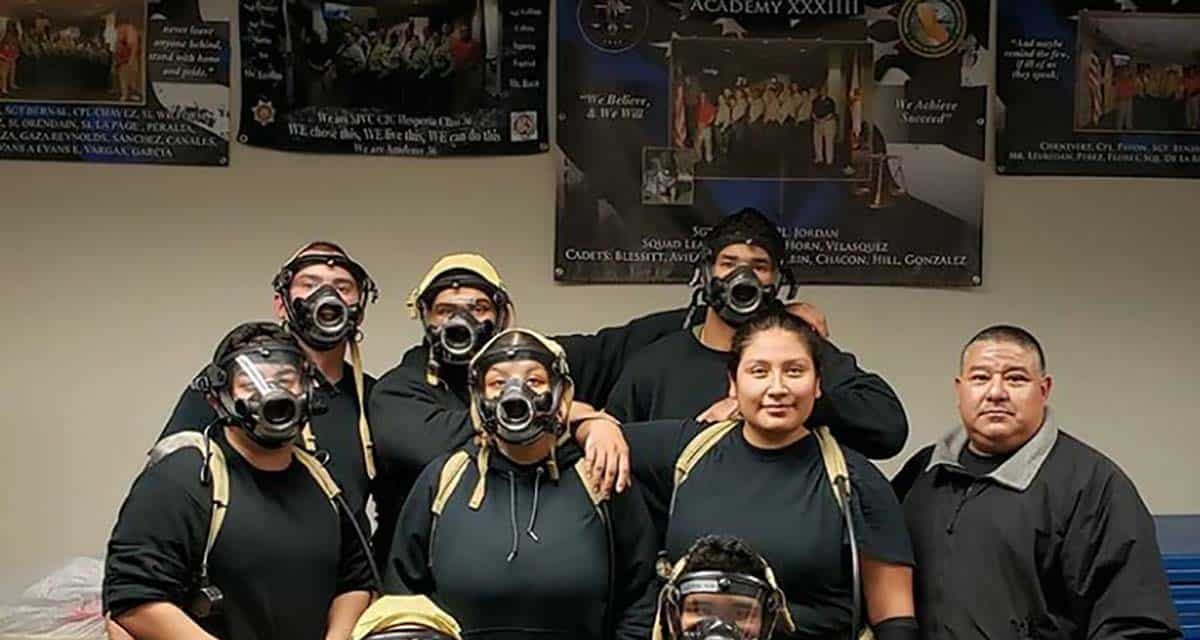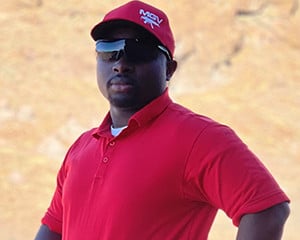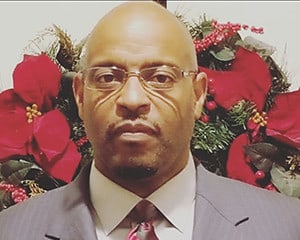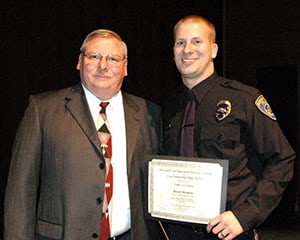Lifelong ‘coach’ leads Criminal Justice: Corrections program

Michael Bocanegra never planned on a career as an educator in Criminal Justice: Corrections, but he spent many years volunteering to coach various sports, including youth baseball, softball, basketball and football. “Since I was eighteen, I’ve always been involved in playing and coaching sports, and teaching is just another form of coaching,” he says.
He didn’t realize then that his skill and passion for teaching and leading others toward success would have such dramatic career implications for himself…and so many others.
Michael was 22-years old, married and starting a family when he was nudged to explore the field of corrections by a couple of cousins who enjoyed the many benefits of their own careers in law enforcement. Toward that goal, he began what would become an almost two-year process.
“I had to pass a written exam, take a physical agility test, complete a medical screening and while all this was going on, I had to fill out a lengthy background check that goes back to age sixteen,” says Michael. “It took several weeks, sometimes months, for each component to clear.” All of these were preliminary steps required for acceptance into the State Correctional Officer’s academy.
Just as he was ready to give up on this seemingly never-ending process, he was approved to participate in the 16-week State academy. The timing couldn’t have been worse. Michael and his wife, Lisa, were about to have their third child, Joshua, who would join siblings Matthew and Brandi.
“The academy was in Galt, California, so there would be no going home at night,” remembers Michael. Fortunately, he and Lisa had a good support system of family and friends, so they decided to make a big family sacrifice for a better future. “I knew I had something I had to do, and that was my focus,” he says.
The weeks whipped by until finally their family-of-five settled into a new life where Michael was a Correctional Officer in a large prison. For the next five years he worked several positions including Housing Unit Officer, Yard Officer, Tower Officer, Search and Escort Officer. “The prison is like a small city, and we are the officers that make the city run,” he says. A transfer and promotion to Correctional Sergeant put him at the top of his team for the next few years.
A previous co-worker and good friend reached out to Michael in 2015 to suggest he interview for a part-time Criminal Justice: Corrections (CJC) faculty position with San Joaquin Valley College’s Ontario campus. It turned out to be a good match.
“I taught everything from Criminal Law and Report-writing to Introduction to Corrections and Chemical Agents (pepper spray, etc.),” says Michael. Two years later he came on board as a full-time faculty member. Two years after that, he was invited to make the biggest leap: faculty to program director. It meant a move to the Hesperia campus, but he and his family were on board.
“I needed a change and I needed a new challenge,” says Michael. “I wanted to see if I could lead my own program. I wanted to help the lives of my instructors, as well as my CJC students.”
He had a lot to bring to the Hesperia campus program. “In our Ontario CJC program, our team was very successful in leading graduates toward positions,” says Michael. “I like to believe that we were all instrumental in getting them into sworn police officer positions, border patrol, sheriff’s department and the California Department of Corrections, working in prisons. I wanted to bring that culture to Hesperia’s CJC program.”
Change is often difficult, and there were lots of changes taking place on the Hesperia campus. Campus leadership positions were in transition and it would take a little while for a smooth rhythm to develop. Current CJC students were used to a more individual approach toward success and Michael was all about team, trust and training. “The program needed a jolt – a shot in the arm,” says Michael.
He was gratified to find a Campus President, Academic Dean and three well-trained and experienced CJC faculty ready to support his vision. “I came in with a plan for what I wanted to do,” says Michael. “They saw I was prepared, and I believe that it helped them to trust me a little more.”
Michael set out to prove himself and bring a successful formula of respect and teamwork into play. CJC faculty would be key players. “Don Nelson, Jacob Shank and Jay Poffek (faculty) were absolutely phenomenal,” he says. “Their instincts, talents, knowledge and experience made them the A team.”
“It’s about accountability: for me, my instructors, my cadets,” says Michael. “Everybody has ownership and they have responsibility for that. We want students to know that we’re not only getting them ready for their careers, but we’re getting them ready to be adults, to be ready for their lives.”
Human nature resists change, but the CJC students saw fairly quickly the advantages of intensifying their efforts and attitudes.
Part of the CJC program is preparing for and passing a physical agility test. Cadets must successfully climb over a 6’ wall, drag a 165 lb. dummy 30’ (timed) and other strength-supported feats. Michael designed and led daily, non-mandatory workouts that in the beginning, only a few students participated in. “When I first started the work-outs some cadets would work-out and other cadets weren’t as serious. By the second month, they all came in and joined the workout. That was the moment for me.” Respect, responsibility and professionalism became the base success could build upon.
“Michael is that type of program director/instructor that just get it,” says Tony Wietek, Hesperia Campus President. “He gets what is needed for the students. He gets what is needed for his faculty. And he gets what is needed to be an integral member of the Hesperia team.”
For all his ambitions for the Criminal Justice: Corrections program, Michael is constantly looking for ways to improve his leadership and lift cadet ambitions. “I question myself every day,” he says. “How can I make it better. What can I do for the students, the instructors to get to even higher ground?”
Michael’s examples of discipline, focus and achievement provide the very roadmap he hopes to instill in others. “Michael is a great blend of seriousness and approachability, especially when it comes to his CJC student and faculty,” says Nicholas Ewell, Academic Dean. “He models a high level of professionalism to his students, and the result is a respectful and organized group.”
Michael doesn’t focus so much on good intentions, his or those whose lives he touches. He is more interested in outcome. “I say it all the time. ‘It’s not how you start that people remember; it’s how you finish’. That’s how people are going to remember you.”
Michael is in the business of helping others reimagine what their ‘finish lines’ can look like. His perspective is constructed from his own personal and professional stretches and accomplishments.
Learn More About A Career In Criminal Justice: Corrections
Criminal Justice: Corrections can open doors to work in private, state, federal prisons or local jails as well as in private security in California. Learn how to join this exciting career and why you should pursue a correctional officer degree.
You might also like
More stories about
Request Information
All fields using an asterik (*) are required.


